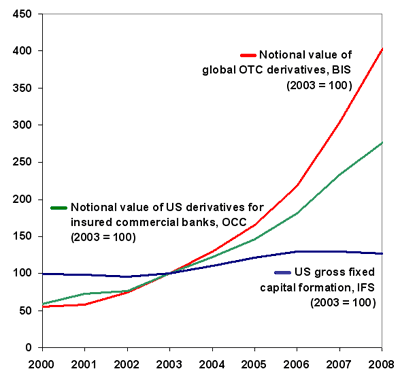 The basic argument in favor of financial engineering is that it allocates risk more effectively and thereby increases capital formation. Which is good. Or would be, anyway, if that’s what happened. Via Ezra, however, Adam Posen and Marc Hinterschweiger take a look at the growth of credit derivatives over the past decade and conclude that it didn’t:
The basic argument in favor of financial engineering is that it allocates risk more effectively and thereby increases capital formation. Which is good. Or would be, anyway, if that’s what happened. Via Ezra, however, Adam Posen and Marc Hinterschweiger take a look at the growth of credit derivatives over the past decade and conclude that it didn’t:
Clearly, growth in new financial products has outpaced fixed capital formation both globally and in the United States by a large margin. This has been especially true since 2006, when investment stagnated, but derivatives continued to grow at a rapid rate. There only seems to be a weak link, if any, between the growth of the newest complex — and now proven dangerous if not toxic — financial products and real corporate investment.
I would just add one other observation to this: the latest and greatest conservative argument for repealing the estate tax is that it would promote capital formation. Without an estate tax, rich people will be motivated to earn more money instead of frivolously spending it, and heirs will get nice big chunks of capital to invest in America. As usual with right-wing economic theorizing, it’s sort of vaguely plausible sounding, and the conservatives pushing it have some nice charts along with a bunch of equations filled with Greek letters to back them up. But then, so did the Wall Street rocket scientists, didn’t they? In the event, though, that turned out to be a self-serving argument. Even trillions of dollars in derivatives didn’t have a noticeable effect.
So then, what are the odds that a change in the estate tax amounting to a few billion dollars will have a serious effect on capital formation either? Slim. And what are the odds that this is just another self-serving argument? That’s an exercise for the reader.















